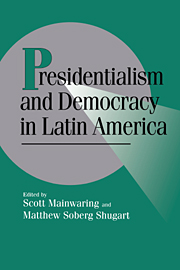Book contents
- Frontmatter
- Contents
- Contributors
- Acknowledgments
- Introduction
- 1 Presidentialism and Democracy in Latin America: Rethinking the Terms of the Debate
- 2 Multipartism, Robust Federalism, and Presidentialism in Brazil
- 3 The Unrealized Potential of Presidential Dominance in Colombia
- 4 Presidential Behavior in a System with Strong Parties: Venezuela, 1958–1995
- 5 Strong Candidates for a Limited Office: Presidentialism and Political Parties in Costa Rica
- 6 Political Sources of Presidencialismo in Mexico
- 7 Evaluating Argentina's Presidential Democracy: 1983–1995
- 8 In Defense of Presidentialism: The Case of Chile, 1932–1970
- 9 Executive–Legislative Relations in Post–Pinochet Chile: A Preliminary Assessment
- 10 Hybrid Presidentialism and Democratization: The Case of Bolivia
- 11 Conclusion: Presidentialism and the Party System
- Appendix: Outlines of Constitutional Powers in Latin America
- References
- Index
9 - Executive–Legislative Relations in Post–Pinochet Chile: A Preliminary Assessment
Published online by Cambridge University Press: 05 June 2012
- Frontmatter
- Contents
- Contributors
- Acknowledgments
- Introduction
- 1 Presidentialism and Democracy in Latin America: Rethinking the Terms of the Debate
- 2 Multipartism, Robust Federalism, and Presidentialism in Brazil
- 3 The Unrealized Potential of Presidential Dominance in Colombia
- 4 Presidential Behavior in a System with Strong Parties: Venezuela, 1958–1995
- 5 Strong Candidates for a Limited Office: Presidentialism and Political Parties in Costa Rica
- 6 Political Sources of Presidencialismo in Mexico
- 7 Evaluating Argentina's Presidential Democracy: 1983–1995
- 8 In Defense of Presidentialism: The Case of Chile, 1932–1970
- 9 Executive–Legislative Relations in Post–Pinochet Chile: A Preliminary Assessment
- 10 Hybrid Presidentialism and Democratization: The Case of Bolivia
- 11 Conclusion: Presidentialism and the Party System
- Appendix: Outlines of Constitutional Powers in Latin America
- References
- Index
Summary
INTRODUCTION
With Chile's return to democracy in March 1990, the Chilean legislative branch reopened its doors for the first time in 16 years. The military coup of September 11, 1973, brought an end to one of the longest periods of democratic rule in South America. The Chilean Congress, virtually in continuous operation from 1823 to 1973, was historically one of the strongest legislative bodies on the continent. It played a key role in the development and maintenance of democracy, serving as an arena for the resolution of political conflict in a highly divided political system by channeling demands and encouraging bargaining, compromise, and consensus.
Despite this impressive record of democratic stability and longevity, military authorities attributed the democratic breakdown to the political process itself, seeing little value in the legislative regime that had helped sustain Chilean democracy for decades before the crises of the 1970s. They blamed the country's political parties and its succession of coalition governments structured in the legislature for the gradual erosion of government effectiveness and the rise of the left. In a decree-law issued on September 24, 1973, the Congress was dissolved, and all legislative functions were indefinitely transferred to the governing junta.
Throughout the process of the negotiated democratic transition, military leaders utilized their considerable leverage to shape the postauthoritarian political system in order to limit the political forces that they viewed as responsible for the institutional crisis of democracy.
- Type
- Chapter
- Information
- Presidentialism and Democracy in Latin America , pp. 321 - 362Publisher: Cambridge University PressPrint publication year: 1997
- 15
- Cited by



